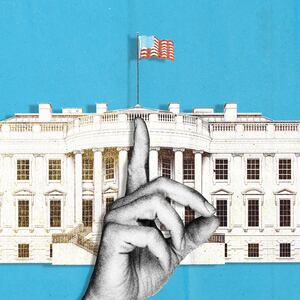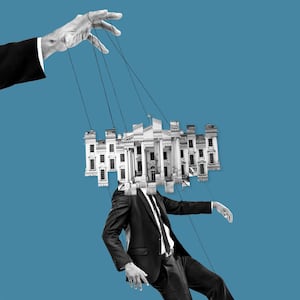For decades, Donald Trump has treasured non-disclosure and non-disparagement agreements, using them to prevent staff and associates from divulging information about his political and corporate empires. But a recent court judgment has called into question just how iron-clad these agreements really are, potentially exposing Trump to many of the secrets he’s worked to keep private in all facets of his life.
Just last week, the Trump NDA regime suffered its most stinging defeat, with a New York arbitrator ruling against Trump in a case that his campaign had fought for three years.
The case stemmed from a 2018 lawsuit the campaign brought against former White House adviser and The Apprentice contestant Omarosa Manigault Newman for her tell-all book, Unhinged. In a massive blow to Trump, the arbitrator ruled that the campaign’s NDA was too expansive and vague to enforce, ordering the campaign to reimburse Manigault for three years of legal fees.
The arbitrator, Andrew Brown, said in his decision that the campaign’s NDA went too far by forcing Manigault “to never say anything remotely critical of Mr. Trump, his family or his or his family members’ businesses for the rest of her life.” Brown ruled that “such a burden is certainly unreasonable.”

An arbitrator ruled that that the Trump campaign’s NDA for Omarosa Manigault Newman was too vague.
Timothy A. Clary/GettyBut this ruling is notable for far more than its implications for Manigault. Namely, it could provide a precedent for MAGA defectors and other spurned associates who, intimidated by the vengefully litigious former president, have kept quiet about some of their inside knowledge.
“This is going to have a massive impact, and it’s because of the way Trump treats people when he’s done with them,” Manigault told The Daily Beast on Sunday, pointing to public humiliations such as getting fired by tweet.
“I really do feel that folks who have been mistreated or embarrassed, who certainly have information to share will go, ‘Hmm—well they haven’t heard this story,’” Manigault said. “There were so many people in the room when he was doing things that were so clearly unlawful, unethical, unhinged—whatever ‘un-’ you want to use—especially people in the White House. It’s not because they’re unloyal or don't care about the office or the country; it’s because of how he treated people.”
Miles Michael, who worked as an art director on Trump’s NBC reality series, The Apprentice, told The Daily Beast on Sunday that he felt empowered to talk publicly and on the record about his former boss, despite the NDA he and many other staffers had signed.
“Politics aside, the way he uses NDAs seems exorbitant,” Michael said. “I last signed one on The Apprentice probably [around] 2015. Why should people be stopped from talking about such a public figure based on an NDA that is ostensibly protecting a completely irrelevant TV show? But ultimately I think it’s about sharing my personal experience about Trump and Family and how I personally feel like their morals are selective and Trump himself is [an] opportunist.”
The Manigault-related decision is the first to follow a court ruling handed down earlier this year by a U.S. District Court judge in New York, regarding the campaign’s suit against former staffer Jessica Denson.
In an emailed statement to The Daily Beast, Denson also called attention to her class-action lawsuit against all Trump NDAs.
“I took on Trump’s illegal campaign NDA as one woman without a lawyer four years ago, and through an unrelenting fight first defeated this NDA back in March. My victory made it possible for Ms. Manigault Newman’s counsel to file for summary judgment and bring closure to her own years-long battle in arbitration,” Denson wrote. “Thanks to my now extraordinary legal team we set a historic precedent against Trump’s illegal censorship, and continue to fight for class certification of my win to free all those who remain bound to silence for life.”
That ruling, which applied strictly to Denson—who has also accused the 2016 campaign of sexual discrimination—did not establish binding legal precedent, though it did give Manigault and others something to build on. Brown nodded to the decision, where the federal judge also found the NDA too sweeping, “much broader than what the Campaign asserts is necessary to protect its legitimate interests, and, therefore, is not reasonable.”
Although both decisions were specific to the campaign’s NDA, the ripples could hit other parts of Trumpland, because of one fact of convenience that has now become extraordinarily inconvenient for Trump: The campaign’s agreement was essentially a boilerplate copy of the NDAs for both the Trump Organization and the White House during his administration.
Trump has cloaked himself in the protection of scary-sounding, multimillion-dollar NDAs throughout his career, political campaigns, and one-term presidency. He wielded them with glee during his years as an NBC reality-TV star, and treasured their utility as the litigious and flamboyant front man of his hereditary business empire. Trump has even invoked the NDAs against people who share his DNA—when it suits him.
Manigault confirmed that Trump’s business NDAs were nearly identical to his political agreements and Trump’s former personal attorney Michael Cohen, who had drafted and executed dozens of NDAs on behalf of the Trump Organization, explained the genesis.
“For the most part, the campaign’s NDA is just a version of the organization’s NDA,” Cohen said. “They used it as a template, but it was also the predicate.”
At the beginning of Trump’s 2016 campaign, he continued, there were no NDAs. “But then there were a couple of issues where [then-campaign manager] Corey Lewandowski was leaking shit to the press and cleverly what he did was he started blaming it on interns,” Cohen said. ”Nothing in Trumpworld stays silent for more than a minute, so he starts blaming the interns and that’s when Trump decides he wants everyone to sign an NDA.”
Cohen, however, said he never signed his. “I just threw it straight into the shredder, and they’re so disorganized that they never knew,” he said.
When Trump’s attorneys later tried to enforce the NDA to prevent Cohen from publishing his memoir, Disloyal, he asked them to provide his lawyers “with this supposed NDA I’d signed, and they never did.”

Michael Cohen, Trump’s former fixer, says he popped his NDA in the shredder.
Spencer Platt/GettyBut while Trump has recently taken his lumps in court, the intimidation tactics have also been successful before.
Brown, the Manigault arbitrator, indicated in his decision that longtime Trump lawyer Charles Harder—routinely tapped by Trump to handle his many defamation suits—had won previous arbitration settlements, though Brown declined to comment further. The Daily Beast reported in September that Harder had over the summer parted ways with the Trump campaign—just ahead of the Manigault ruling—for reasons that are still unclear.
While the details and defendants in those victories may never become public, campaign disclosures from 2019 and 2020 suggest Trump has lost at least four cases in arbitration, at a total cost of more than $180,000 in fees. None of the money in those cases came from Trump himself, but was drawn from donor funds.
Manigault, who had previously served in the Clinton White House, said she had “never been presented with an NDA until the Trump administration.” And she noted she wasn’t asked to sign her NDA until “two or three months into the administration,” after “the leaks started happening.”
But she never signed it.
“It wasn't that I was being rebellious, it was just that the document didn’t feel right. It didn’t look anything like a government document. There wasn’t even a form number on it. This felt like a private sector document. It was just like every other Trump NDA I’d had to sign over the years,” she said. “The only thing missing was the Trump logo.”
The Trump administration’s NDA program also appeared unique in that incoming interns were threatened with “criminal prosecution” and a cartoon image of a jailhouse, according to Trump White House documents and slides from a PowerPoint-type presentation reviewed by The Daily Beast.
Zoe Jackman, President Trump’s then-director of the internship program, was known to warn incoming internship classes of being not just “leakers,” but also “liberals” and “liars,” according to two people familiar with the matter.
Like the campaign agreements, the slides, which addressed the topic of NDAs for inbound White House interns, also covered a broad sweep. They defined “confidential information” as “all nonpublic information I learn of or gain access to in the course of my official duties in the service of the United States Government as a White House intern, including information regarding the United States Government, the White House, the Administration, the President, the Vice President, the First Family, the family of the Vice President, or related topics.”
The presentation added that interns “may not divulge confidential information” via:
- “Communications, including oral communications, with members of the press.”
- “Communications, including oral communications, with employees of federal, state, and local governments, when the disclosure of confidential information is not necessary to the performance of my official duties, except as authorized by the Chief of Staff to the President, the Counsel to the President, or their respective designees.”
- “The publication of works of fiction that contain any mention of the operations of the White House, federal agencies, foreign governments, or other entities interacting with the United States Government that is based on confidential information.”
And:
- “The publication of works of nonfiction.”
Another slide—titled the “Consequences of Unauthorized Disclosure”—told interns they were signing the NDA “as a condition of your internship,” and that the “legally binding document” would include their agreement about “potential actions that the Government may pursue in the event of an unauthorized disclosure.”
The panel then enumerated several criminal and civil statutes, along with “Tarnished Reputation,” as among the administration’s options for retaliation.
But the enforceability question still looms large. Trump not only lost the campaign cases with Denson and Manigault; his White House efforts have suffered defeats as well, and he has dropped other actions.
In 2018, Cohen and Trump decided to drop their enforcement of an NDA signed by Stormy Daniels, the adult film star to whom Trump, through Cohen, had paid $130,000 in hush money days before the 2016 election.
Trump, and his brother Robert, also lost a 2020 legal effort to stop Trump’s niece, Mary Trump, from publishing her 2020 memoir Too Much And Never Enough. The judge in that case also found the NDA too vague to enforce. Trump is suing his niece again for giving what he calls confidential information—his tax returns—to the New York Times.
The Trump-era Department of Justice targeted one of its NDA lawsuits at Stephanie Winston Wolkoff, a former adviser to first lady Melania Trump who published a book about her time in the White House. The DOJ dropped that case shortly after President Joe Biden took office. A similar DOJ lawsuit against former National Security Adviser John Bolton for his White House memoir, The Room Where It Happened, was also dropped under Biden. He settled another case against former campaign staffer Sam Nunberg.
Trump also threatened to sue former White House staffer Cliff Sims over his 2019 book, Team of Vipers. Sims quickly punched back, suing the president. However, Trump let the case go after he became convinced that Sims’ account painted him in a flattering light. He later brought Sims back into the fold, giving him a top-secret position at the Office of Director of National Intelligence.











